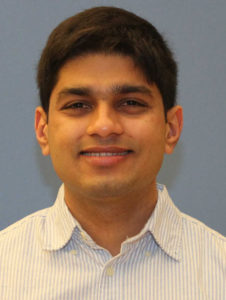 The Department of Mechanical Engineering is excited to welcome Dr Ashwin Renganathan as an Assistant Professor this fall. Dr Renganathan received his Ph.D. in aerospace engineering Georgia tech, where he focused on aerospace systems design.
The Department of Mechanical Engineering is excited to welcome Dr Ashwin Renganathan as an Assistant Professor this fall. Dr Renganathan received his Ph.D. in aerospace engineering Georgia tech, where he focused on aerospace systems design.
The design of an aerospace vehicle can cost billions of U.S. dollars and decades for research, development, certification, and qualification. Therefore, Renganathan’s research as a graduate student addressed the question, how can aerospace engineers make faster and reliable decisions, with limited information in the presence of uncertainty? As part of his graduate and Ph.D. dissertation research, Renganathan has worked on several simulation-based design problems including sensitivity analysis, multidisciplinary design optimization, large-scale design optimization, principled model reduction, and uncertainty quantification. His work has been sponsored by major aerospace corporations including Airbus, Safran, Siemens, NASA, and the Federal Aviation Administration (FAA).
Before joining the U, Renganathan completed a postdoctoral appointment in the division of Mathematics & Computer Science (MCS) of the Argonne National Laboratory, where his work was sponsored by the U.S. Department of Energy’s Advanced Scientific Computing Research (ASCR) program. At Argonne, he underwent training on developing principled mathematical methods for solving engineering decision-making problems.
Research Statement. At the Computational complex engineered Systems Design Laboratory (CSDL), we are interested in developing scalable computational methods for the design of next-generation complex engineered systems, e.g., aircraft, spacecraft, and rotorcraft. Specifically, we are interested in developing simulation-based design methods, where the goal is to make system-level design decisions in the presence of uncertainty and high-dimensional design spaces, with computationally expensive models of the system. Our research finds application in the preliminary and detailed design phases of aerospace, marine, mechanical, and naval engineering.
Why Utah? The department has a distinguished set of faculty with expertise in core technologies and fundamental research—e.g., materials design, thermal & fluid sciences, robotics— essential for the next generation aerospace systems.
“This will help me in forging several new collaborations within the department to apply my ‘system-level’ research,” said Renganathan. “Furthermore, my research in aerospace engineering and complex systems design is novel for the department — therefore I am thrilled to be able to contribute toward unique set of research expertise for the department.”
“Additionally, at a personal level, my wife and I enjoy outdoor activities, so the state of Utah suits us well,” said Renganathan.